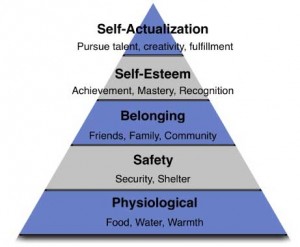World renowned psychologist Abraham Maslow once ordered all our needs into a rigid pyramid of importance. As Maslow argued, at the base of all our needs is what keeps us physically alive as human beings. As the pyramid narrows toward the top, meeting physiological needs transitions toward meeting more internal, emotional needs. He deemed this to be what founds a “stable” individual.
However, is it true in every moment that we put our physical “needs” before what we mentally desire? Can Maslow’s rigidity ever flex? I don’t want to believe our needs in life are so austerely structured.
For the traveler, if you surround yourself with adventures, you soon let go of ‘petty’ worries. In a new city with so much to explore, you postpone meals to catch the last view, or forgo sleep to make the most of your time. Who needs three proper meals a day or eight hours of sleep every night when there is so much to explore? In a continual state of wanderlust, the adventure becomes greater than the prevalence of stability.
Then there are artists, leaders, students, who often become so engrossed in their work that they forget to eat. You know it’s a true passion project when you find yourself caffeine fueled and wonderfully raccoon eyed. The term “starving artist” has been coined for a reason, because there are people who put fulfillment, achievement, and recognition before seemingly all else. People give up their entire careers of stability to change paths. To follow their dreams, people leave the familiar security of their families and warm homes to pursue an unknown. They spend the meager coins they have on supplies for success instead of food for the stomach. For these dedicated individuals, the pursuit of an ultimate goal always takes precedence when fear of failure is a more dire consequence than exhaustion and uncertainty.
Other times, when people are so lovesick, homesick, or nostalgic, they lose all interest in eating or sleeping. Emotions can often be so powerful that they trump sensations of hunger or exhaustion. Sometimes the desperate desire to be loved brings on sleepless nights, as we lay awake wishing for love and happiness.
In so many cases, we allow our senses to take over our physical needs. Of course, to be a stable population, we can’t be starving or dehydrated or freezing or dying of heatstroke. But why can’t we let our senses lead the way—allow our sense of wanderlust, our drive toward success, or our motivation for productivity lead the way? Maslow, is your hierarchy of needs as rigid as life must be?
I’m not here to argue with a world famous man of science. I simply believe that as humans, we are not, or should not, always be reduced to an exact science. In the precise field of psychology, Maslow may be (is) correct. However, humans are far more than breathing beings. We are thinking and feeling beings, who often put our hearts before our heads.
We surely don’t always do what’s right. This is definitely not the ideal method of survival—but it sure is how we are.
Tags : artist, belong, career, dream, emotions, Goal, life, lifestyle, loss, Love, maslow, Maslow’s Hierarchy, Miscellaneous, passion, psychology, Science, stability, Travel, Wanderlust

Subscribe. Follow. Like.
To RSS Feed
Followers
Fans